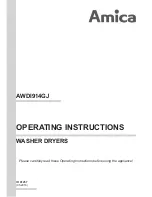
Dishwasher / User’s Manual
17 / 39
EN
Preparation
C
Wipe clean any spilled rinse aid
outside the reservoir. Rinse
aid that spilled accidentally
will cause foaming and it will
eventually decrease washing
performance.
4. Turn the rinse aid amount adjuster
manually to a position between 1 and
6 (4). If there are stains on tableware
items after washing, level must be
increased and if there is a blue trace
after wiping them by hand, it must be
decreased. This is set to position 4 as
factory default.
Items not suitable for washing in the
dishwasher
•
Never wash dishes soiled by cigarette
ash, candle remnants, polish, dyestuff,
chemicals, etc. in your dishwasher.
•
Do not wash iron alloy items in the
dishwasher. It can get corroded or
leave stains on other items.
•
Do not wash cutlery with wooden or
bone stems, glued pieces, or pieces
that are not resistant to heat, as well
as copper and tin-plated containers in
the dishwasher.
4. Make the appropriate rinse aid
settings.
C
Depending on the model,
salt indicator and/or rinse aid
indicator must be enabled again
if they were disabled before.
Rinse aid
C
The rinse aid used in
dishwashers is a special
combination used to increase
drying efficiency and prevent
water or limescale stains on the
washed items. For this reason,
care must be paid to have rinse
aid in the rinse aid reservoir
and to use rinse aids produced
specially for dishwashers only.
1. Open the lid of the rinse aid reservoir
by pressing its latch (B).
2. Fill the reservoir until “MAX” level.
3. Close the lid of the reservoir by
pressing on it lightly.
















































